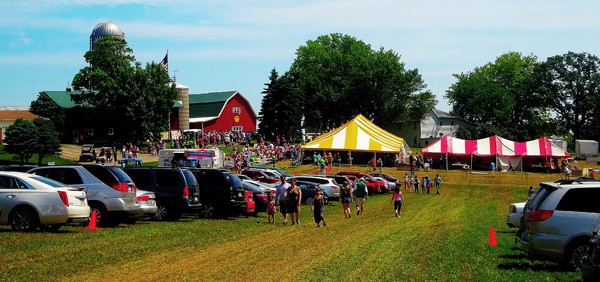 UPDATED MARCH 2021
UPDATED MARCH 2021
In January 2018, the Minnesota Department of Health launched Safer Farm Animal Contact Exhibits (Safer FACEs), a training program for agritourism venues. The free, web-based, at-your-own-pace training offers an opportunity for owners and staff of these operations to learn how to keep visitors safe from illnesses that can spread from animals to people.
“The goal of the Safer FACEs training program is to provide education that will help public animal contact venues prevent illness in their visitors,” said Malia Ireland, epidemiologist with the Zoonotic Diseases Unit. “This training is tailored for farm businesses such as the owners, operators, and staff of apple orchards or pumpkin patches that have petting zoos, farms that offer field trips or tours of their animal facilities, and county fairs.” The training program is also for anyone planning to have the public interact with farm animals.
REGISTER FOR SAFER FACES HERE- Email SaferFaces@state.mn.us for more information. Please include the following information: your name, your animal contact venue, and the best way to contact you.
- Alternatively, please call 651-201-5414 and ask about Safer FACEs.
“Knowing how to set-up your venue properly can reduce the risk of spreading illness. Operators shouldn’t wait until they are part of an outbreak to take steps to protect their visitors and their business.”- Carrie Klumb, Senior Epidemiologist Zoonotic Diseases Unit, Minnesota Department of Health
Broken down into six modules, Safer FACEs takes learners through the finer points of disease and injury prevention at an animal contact venue, including:
- Common health risks from animals and why owners/operators must be aware of them
- How facility design can impact disease transmission
- How type of animal and animal management affect the risk to human health
- Topics for training staff on best practices
- Methods for educating visitors on risks and prevention
- Appropriate signage and handwashing
“We know owners and operators of animal contact venues are strapped for time,” said Ireland, “so we focused the training on the most important parts of disease and injury prevention at an animal contact venue.”
The six modules and accompanying short quizzes should take roughly 2-3 hours to complete with users being able to exit and return to the training as needed. When complete, MDH will provide certification that your organization has learned best practices for visitor-animal interactions.
“Even healthy animals can carry germs that make people sick, taking the Safer FACEs training will equip you and your staff with the tools to help avoid the spread of disease while maintaining all the fun of farm animals.”– Carrie Klumb

What are people saying about the training:
“I enjoyed taking the course. One of the reasons for taking the course was to help us not only know we should be doing but to help us see what we are already doing that is part of best practices. Part of my job is training and mentoring new staff. I will definitely be having them take this course to help them understand why we do things the way we do at the farm.”
“The topics were informative and I feel we will be better prepared for our county fair.”
“The training is great. What I really like about this training is that it is something I can have all my volunteers do.”
“One of the reasons for taking the course was to help us not only know what we should be doing but to help us see what we are already doing that is part of best practices. Part of my job is training and mentoring new staff. I will definitely be having them take this course to help them understand why we do things the way we do at the farm.”
“I really enjoyed the course. It was easy, visual, and didn’t take much time to complete. I felt like what I learned was valuable. I liked how key points were addressed multiple times to reinforce that knowledge such as calves being a high-risk animal for young children, etc.”
“I think the training was well put together and very informational.”
View more agritourism resources at:
umash.umn.edu/agritourism
The Upper Midwest Agricultural Safety and Health Center (UMASH) provided funding for Safer FACEs.
